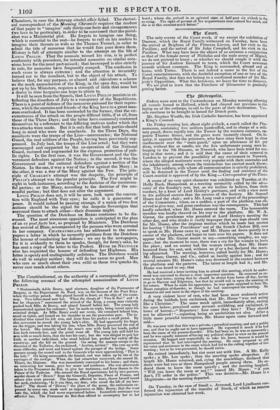Cbe
Orders were sent to the Customhouse on Monday morning allowing all vessels bound to Holland, which had cleared out previous to the laying on of the embargo, to sail to the ports of their destination. Ves- sels continue to be brought in bound for Dutch ports.
Mr. Stephen Woulfe, the Irish Catholic barrister, has been appointed a King's Counsel.
On Friday evening last, about eight o'clock, a coach called the Phe- nomenon, containing five soldiers handcuffed, and in charge of a mili- tary guard, drove rapidly into the Tower by the western entrance, op. posite Thames Street, and the gates were instantly closed. On in- quiry, it appears that the prisoners, who have since been kept in close co. nfinement over the "main guard," upon an allowance of 6d. per diem, without fire or candle, are the five unfortunate young men be- longing to the 7th Hussars, at Norwich, who have been tried for mu- tiny in that town ; and it is said that the cause of their removal to London is to prevent the possibility of any excitement in Norwich, where the alleged mutineers were very popular with their comrades and the inhabitants, among whom the transaction has excited much discue. sion. The soldiers, with whom all communication is strictly prohibited, will be detained in the Tower until the finding and sentence of the Court-martial is approved of by the King.— Correspondent of the Times.
A scene of no very quiet character was exhibited on Tuesday, at the Holly Bush, Hampstead, at a meeting ostensibly called by the advo- cates of the Sunday's rest, but, as we incline to believe, from their conduct, by a knot of Lord Henley's partisans, and with a view more to his political success than the success of the Society. Mr. Samuel Hoare took the chair; and a Mr. Long read a report of the proceedings of the Committee ; when, on a sudden, a part of the platform was ob- served to give way, and great confusion was the consequence. This had hardly subsided, when Mr. .Hume entered the room. The honourable member was loudly cheered on his way to the platform. Mr. W. A. Garrat, the gentleman who presided at Lord Henley's meeting the other day, and who thinks it vastly improper that any man should vote for Mr. Hume, after the impious motion which he made last session for leaving "Divine Providence" out of the Scotch Cholera Bill, rose to speak as Mr. Hume came in; and Mr. Hume sat down quietly in a corner of the platform, and began to turn over his papers. It does not appear what Mr. Garrat meant to say—something naughty, we sup- pose—but the moment he rose, there was a cry for the women to leave the place ; and no sooner had the women retire4, than Mr. Hoare bounced from his seat, and, without an if or a but, declared the meet- ing adjourned. The meeting, however, called lustily for Mr. Hume; Mr. Hoare, Garrat, and Co., called as lustily against him ; and for several minutes Mr. Hume's voice was drowned in the contest between the platform and the parterre. The latter at length had it; and Mr. Hume was heard to say, that
He had received a letter inviting him to attend this meeting, which he under. stood was convened to discuss a most important question. He returned an an- swer to that letter, stating that he should be absent from home all day, having to go to Harrow and Edgeware, but that he would call in upon the meeting on his return. When he made his appearance, he was quite surprised to hear .Mr. Hoare complain of disorder, as though lie had interrupted the meeting. He wanted to aid and assist in the object of the meeting.
A very violent lover of rest, who had been most zealously active during the hubbub, here exclaimed, that Mr. Hume " was not acting like a Christian." The same meek spirit, immediately after, casting his eyes below, perceived some persons scribbling, and exclaimed, in tones of horror—" Reporters ! how came they .here ? They should not be allowed ! "—reporting being an unchristian act also. After a little more peaceful interruption, Mr. Hume again came forward and said— He was now told that this was a private, a parochial meeting, and nota public one, and that he ought not to have appeared. He regretted it much if he had been the cause of the present disorder. If he had been so, he was so innocently; and he was equally innocent of having any political object in view on the present occasion. He begged now respectfully to take his leave, because it would be represented that he had interrupted the meeting. He came prepared to add his voice and assistance in the cause which had led to the calling together of this meeting ; but as he was prevented, he should retire. He retired immediately, but riot went not with him. A Mr. Kelly spoke ; a Mr. Lee spoke ; then the meeting spoke altogether. At length Mr. Hoare returned, and, eying the assemblage, declared that there were but two or three Hampstead people among them. He or- dered them to leave the room quietly ; and the meeting laughed. " Will you leave the room or not ? " roared Mr. Hoare : " if you don't, I'll order in the police." This was decisive—Mr. Hoare is a Magistrate—so the meeting departed.



























 Previous page
Previous page